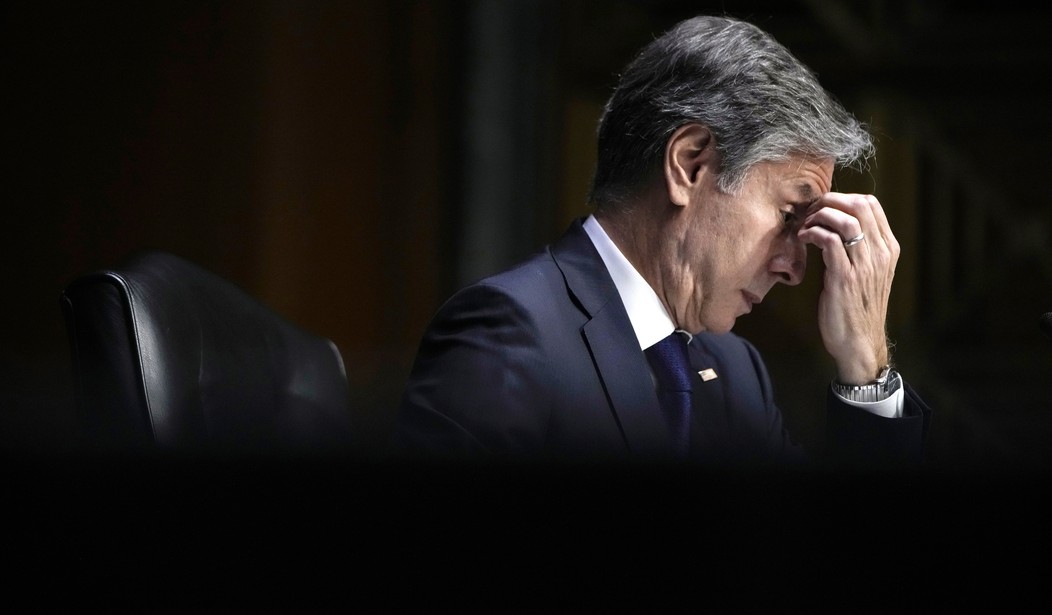We learned yesterday that Secretary of State Antony Blinken had delivered a written response to Russia regarding its demands in terms of the Ukraine situation. We still have little to no idea what the details of the “offers” included in the letter were, but we were told that pretty much nothing had changed. This morning, Kremlin spokesman Dmitry Peskov didn’t specifically use the word “garbage,” but he informed reporters that the details of the offer “leave little ground for optimism.” Russia’s Foreign Minister sounded slightly more optimistic, saying that the letter “contains some elements that could lead to the start of a serious talk on secondary issues.” But he went on to note that there were “no positive responses” on the main issue of Ukraine and NATO. In other words, all of the ongoing talks between multiple parties haven’t produced any suggestion of a path forward. (Associated Press)
The U.S. rejection of Russia’s main demands to resolve the crisis over Ukraine leaves little ground for optimism, the Kremlin spokesman said Thursday, while adding that dialogue was still possible.
Tensions have soared in recent weeks, as the United States and its NATO allies expressed fear that a buildup of about 100,000 Russian troops near Ukraine signaled Moscow planned to invade its ex-Soviet neighbor. Russia denies having any such designs — and has laid out a series of demands it says will improve security in Europe.
But as expected, the U.S. and the Western alliance firmly rejected any concessions on Moscow’s main points Wednesday, refusing to permanently ban Ukraine from joining NATO and saying allied deployments of troops and military equipment in Eastern Europe are nonnegotiable.
The most disturbing aspect of this entire process is once again the completely lack of transparency on the part of the Biden administration. The “written response” to Russia was delivered without the press ever getting a look at it. The State Department told us that there “is no change and will be no change” in the American position, but went no further than that. It was mentioned that there were other areas where “some” of Russia’s concerns might be addressed, potentially “offering a path to de-escalation.”
But that was it. That’s all we were told. I have yet to see any confirmation that the letter was even show to anyone in Congress. We could be potentially be on the brink of a major war in Europe and the Biden administration is flying solo on the entire matter. I know what you’re thinking. Why should I be worried about that? I mean it’s not as if this matter is being handled by an administration that has botched virtually every aspect of foreign policy it’s gotten its hands on so far, including the disastrous withdrawal from Afghanistan, insulting our allies in Australia, and nearly losing our naval base in the Marshall Islands to China, right? What could possibly go wrong?
As I’ve written here previously, I’m still not 100% convinced that Vladimir Putin is committed to invading Ukraine if he doesn’t get his way from us. I’m not ruling it out, but his continued insistence that there is no invasion coming is starting to ring at least slightly more true as he watches the largely unified response from America and our allies (with the glaring exception of Germany). Then again, with everyone (including us) continuing to insist that our response to an invasion will be economic rather than military, he might just assume that the coast is clear. And Joe Biden’s suggested invitation to execute a “minor incursion” could sway him as well.
Across the pond, our allies in the United Kingdom are seeing it differently. UK Defense Secretary Ben Wallace told reporters yesterday that he’s planning a trip to Moscow to try to negotiate some sort of resolution, but he’s “not optimistic” that an invasion can be prevented.
Mr Wallace has also confirmed that he’ll soon be travelling to Moscow for talks with Russia’s Defence Minister, Sergei Shoigu. But he’s lowering expectations of any diplomatic breakthrough. He told the BBC there’s still “a chance” that an invasion by Russia could be stopped, but he added “I’m not optimistic”.
The UK’s response to Russia’s military build up has, in the words of one foreign diplomat, been “more muscular than most”.
The Brits have been the most aggressive in bolstering Ukraine’s military defenses. They’ve sent thousands of anti-tank missiles to them already, along with troops to train them. They’re currently trying to convince more European allies to do the same, but many of those countries seem to be mostly staying on the bench aside from voicing opposition to an invasion.
The ground is reportedly fully frozen over along the Ukrainian border now. If Putin wants to start rolling tanks in the direction of Kyiv, this would be the time to do it, though mid-February would probably be closer to ideal. If Russia doesn’t move in by late March, however, the window of opportunity will be starting to close and this may turn out to have all been bluster on Moscow’s part.








Join the conversation as a VIP Member